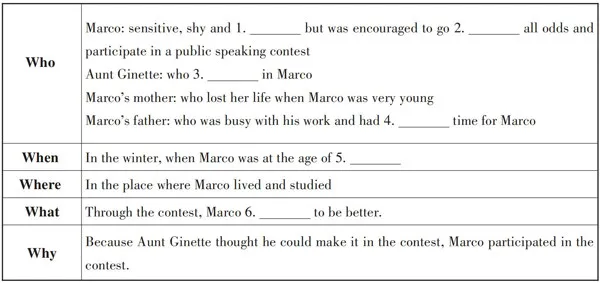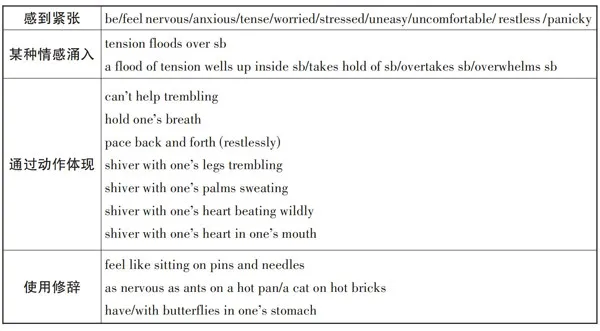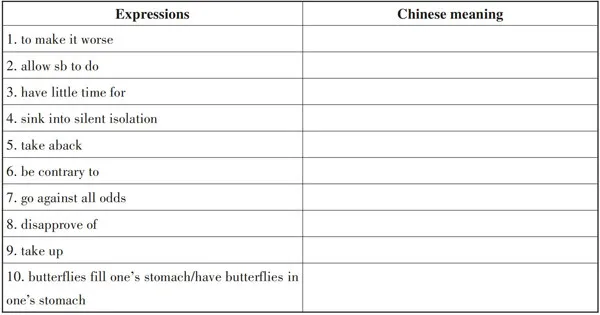When someone believes in you当有人相信你时




1 Sensitive, shy, and timid (胆怯的), Marco always wore turtleneck (高领套头衫) shirts. To make it worse, Marco was naturally shorter than the other kids. And because his good marks had allowed him to skip second grade, he was younger than everyone else. However, this added nothing to his already low self⁃confidence.
2 Marcos mother lost her life when Marco was very young. After that, Marco lived with his father. When Marco was eight, his father got promoted in office and became busier than before. Marco felt that his father had little time for him. He began to be afraid of coming home from school and sank into silent isolation every day, feeling unappreciated, inadequate, depressed and confused.
3 When Marco was 14, his aunt Ginette called him one day in winter. To Marco, this seemed like a miracle, for she usually only called him once a year, on his birthday. She said that she had just seen some young teenagers participate in a public speaking contest—and she thought about him. She told him she firmly believed that he could perform on stage like the other kids, since she had seen him do skits (滑稽短剧) for the family during some festivals.
4 Marco was startled, and not a little taken aback. In a public speaking contest? To agree would be contrary to his entirely shy, timid personality. But Aunt Ginette was so confident. She truly believed in him. And feeling her strong belief, Marco went against all odds and agreed to enter the contest.
5 All that winter, twice a week after dinner, he took three different buses in each direction for the three⁃hour round⁃trip to practice. Marco was taken by the energy he had never felt before. The hours and the obstacles no longer counted. Marcos father disapproved of his participation in the speaking contest, fearing it would take up his homework time. But Marco was a top performer in school and never missed a day.
6 Four months later, the big night arrived. And of course, his aunt Ginette was in the audience. The nine other contestants were all older than Marco. Marco was overwhelmed—the whole thing just felt so much bigger than him, and butterflies filled his stomach.
[Reading][Check]
阅读上面的短文,根据所给情节进行续写,使之构成一个完整的故事。
注意:
1. 所续写短文的词数应为150左右;
2. 续写部分分为两段,每段的开头语已为你写好。
Paragraph 1:
Hearing his name called, Marco stepped onto the stage.
Paragraph 2:
As the winner, Marco went on to the regional final, where he won again!
写作导引
一、语篇研读
(一)基本要素
(二)主题探索
What is the text about? And what does the author want to tell us through Marcos experience?
二、语言学习
(一)词块
(二)句式
1. 非谓语V⁃ing形式作状语,表示伴随、原因等
He began to be afraid of coming home from school and sank into silent isolation every day, feeling unappreciated, inadequate, depressed and confused. (Para. 2)
他开始害怕放学回家,每天都陷入沉默的孤独中,他感到不被赏识、自卑、沮丧和困惑。
And feeling her strong belief, Marco went against all odds and agreed to enter the contest. (Para. 4)
感受到她深深的信任,Marco克服一切困难,同意参加比赛。
Marcos father disapproved of his participation in the speaking contest, fearing it would take up his homework time. (Para. 5)
Marco的父亲不同意他参加演讲比赛,担心那会占用Marco写家庭作业的时间。
2. 原因状语从句
To Marco, this seemed like a miracle, for she usually only called him once a year, on his birthday. (Para. 3)
对Marco来说,这似乎是一个奇迹,因为她通常每年只在他生日那天给他打一次电话。
She told him she firmly believed that he could perform on stage like the other kids, since she had seen him do skits for the family during some festivals. (Para. 3)
她告诉他,她坚信他可以像其他孩子一样在舞台上表演,因为在一些节日里她看到过他为家人表演滑稽短剧。
3. 宾语从句
Marco felt that his father had little time for him. (Para. 2)
Marco认为他父亲几乎没有时间陪他。
(三)即学即用
1. 我疯狂挥手,祈祷出租车停下来。(使用V⁃ing形式作状语)
2. 由于钱不够,我们没有买那些书。(使用原因状语从句)
3. 我觉得做出这个决定没有足够的依据。(使用宾语从句)
三、续写技能
(一)表达“紧张”的短语
(二)表达“紧张”的句子
翻译:我很紧张。
方法一:增加细节描写。
1. 站在舞台上,她紧张到脸色发白、手发抖。
Standing on the stage, she was very nervous, her face white and her hands shaking.
Standing on the stage, so nervous was she that her face was white and her hands were shaking.
2. 站在舞台上,一阵紧张感突然袭来,她的心都快跳出来了。
Standing on the stage, a flood of nervousness took hold of her, (with) her heart almost leaping out from her body.
方法二:使用特殊句式。
3. 紧张不安,他在房间里来回踱步。(形容词作状语)
Nervous and restless, he was pacing back and forth in the room.
4. 是老师们的信任和鼓励帮助我克服了紧张情绪。(强调句型)
It was the teachers confidence and encouragement that helped me overcome my nervousness.
5. 她很紧张,手心出了很多汗。(with的复合结构)
She felt extremely nervous with her palms sweating heavily.
6. 第一次被要求翻译报纸上的文章,他感到紧张,低着头。(非谓语动词作状语)
Required to translate articles in the newspaper for the first time, he felt nervous, lowering his head.
四、续写布局
文章最后一段末尾,Marco不知所措,非常焦虑、紧张。根据续写第一段的段首句“听见喊到他的名字,Marco走上舞台”和续写第二段的段首句“作为获胜者,Marco 晋级到区域决赛,并再次获胜!”可推测,续写第一段的内容应围绕Marco克服紧张并最终取得比赛胜利而展开。写作时,可结合原文对Marco的相关描写来展开。Marco敏感、害羞、胆怯,但是,伯母信任他,而且他自己坚持训练,再加上曾经表演过滑稽短剧,他有天赋和基础。因此,续写第一段可着重描述Marco从紧张到自信的变化。具体情节发展,可根据以下问题链推测:
1. How did Marco feel and what did Marco do?
2. What did Marcos aunt do?
3. How was Marcos speech?
根据续写第二段的段首句“作为获胜者,Marco 晋级到区域决赛,并再次获胜!”,结合文章的主题——因为被信任,Marco勇敢参赛,积极准备,并最终赢得比赛,可推测,续写第二段应围绕Marco赛后获得自信、重获新生展开。具体情节发展,可根据以下问题链推测:
1. What happened to Marco?
2. How did Marco change?
3. What did Marco think about confidence?

